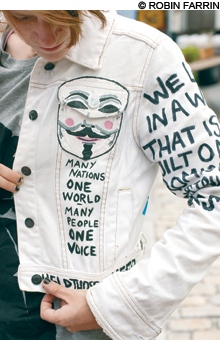
SMALLER, BUT NO QUIETER The public face of OccupyMaine may have dwindled in size, but it’s not any more subdued than at its outset, with protest art, speeches, wearable political statements, and ubiquitous cardboard signs. |
"This occupation is not ending," one speaker said."We are far from dead," another proclaimed.
They were in Monument Square on Monday, September 17, celebrating in solidarity with their counterparts in New York City on the one-year anniversary of Occupy Wall Street. Standing on a granite slab they dubbed "The People's Soapbox," they spoke about the changes the movement has effected, from initiating widespread debate about income inequality to amping up public discussions about use of public space.
But as much as these die-hard Occupiers (and these were definitely the die-hards; the group of about 20 activists comprised many familiar faces from the Portland, Bath, and Brunswick Occupy chapters) sought to highlight the positives, they seemed equally eager to declare that the Occupy movement is, without question, alive and well.
In a piece published last week on the Huffington Post website, author and activist Rebecca Solnit wrote: "[T]he one-year anniversary is likely to produce a lot of mainstream media stories that will assure you Occupy was only a bunch of tents that came down last year, that it was naïve, and that's that. Don't buy it."
Indeed, Occupiers everywhere been inundated with questions about the movement's continued evolution, about whether their message has been diluted over the last 12 months, about whether anything has really changed since last fall. The loss of tent cities across the United States served for some as a symbol of Occupy's dissolution.
"[T]he fact is that the Occupy movement has already had extraordinary results," Solnit continued. "We changed the national debate early on and brought into the open what was previously hiding in plain sight: both the violence of Wall Street and the yearning for community, justice, truth, power, and hope that possesses most of the rest of us. We found out something that mattered about who we are: we found out just how many of us are furious about the debt peonage settled onto millions of 'underwater' homeowners, people destroyed by medical debts, and students shackled by subprime educations that no future salaries will ever dig them out of. And here was Occupy's other signal achievement: we articulated, clearly, loudly, incontrovertibly, how appalling and destructive the current economic system is. To name something is a powerful action."
So, what next? As OccupyMaine celebrates its first birthday, it seeks ways to stay relevant — to transform anger into answers and to channel national (and even international) sentiment into local solutions. And if the movement looks different than it did last year, well, that might be for the best.
"If OccupyMaine stayed the same, it wouldn't be any better than the political structures that we are fighting against," says Katherine Hulit, a co-founder of Occupy USM. "Since the camp closed down, it has evolved into more of a coalition of people in the community who want to transform the city of Portland in various ways."